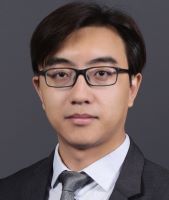Future "Cements": From Materials to General Sustainability
12:00 p.m. to 1:00 p.m.
United States
Talk from Professor Hongyan Ma from University of Missouri Science and Technology on Future "Cements": From Materials to General Sustainability.

Biography:
Dr. Hongyan Ma is an associate professor of civil/materials engineering and Francisco Benavides Scholar at Missouri University of Science and Technology. He received his bachelor’s degrees in Inorganic Non-metallic Material Engineering and in Law (2005) and master’s degree in Structural Engineering (2008) from China, and PhD in Civil Engineering (2013) from the Hong Kong University of Science and Technology. Before joining Missouri S&T as an assistant in October 2015, he worked as a Postdoctoral Fellow (directing a fuel cell innovation project) in HKUST. In September 2021, he was promoted to associate professor and granted tenure. Dr. Ma has been directing the Lab of Future Cements and Carbon-negative Initiatives (FuCCI) to conduct research regarding future cements, biotechnology in construction, smart systems for testing and evaluation, multi-scale characterization and modeling (from molecular dynamics to macro-scale FEM), concrete deterioration and damage mitigation, solid waste upcycling, gigaton-scale CO2 sequestration, thermal energy storage, and critical mineral recovery. Dr. Ma’s research has been funded by NSF, US DOT, DOE (ARPA-E and FECM), DARPA, EREF, AIST, University of Missouri System, and industry. He has published 110 papers on prestigious journals, and these publications have received 6,000 citations with an h-index of 41. He is an associate editor for ASCE Journal of Materials in Civil Engineering and an editorial board member of another two journals. Dr. Ma has received numerous awards and recognitions, such as ASCE ExCEEd Fellow (2017), CEC Dean’s Scholar (2019-2021), and Missouri S&T Faculty Research Awards (2019 and 2022), Faculty Excellence Award (2020), and Outstanding Teaching Award (2021).
Abstract:
As the dominant binder material for concrete, portland cement (PC) has been manufactured at a scale of >4.5 Gt/year. Realizing that the production of PC is responsible for approximately 8% of anthropogenic CO2 emissions, the cement and concrete industry has a burgeoning interest in enhancing the eco-efficiency of PC. For this purpose, the United Nations Environment Program Sustainable Building and Climate Initiative has identified three pathways: (a) increasing use of supplementary cementitious materials (SCMs); (b) improving cement efficiency; and (c) developing sustainable alternative cements. The 2050 carbon-neutral goal of the cement industry is too rigorous to be addressed by single pathways, and, thus, innovations in all the three categories will be needed. In this seminar, recent innovations in the Lab of Future Cements and Carbon-negative Initiatives (FuCCI) for eco-efficiency improvement of cement will be presented, and a class of “carbon-negative” cementitious materials will be highlighted. Furthermore, a broader range of “cements” and their potential applications in thermal energy storage (for grid-interactive energy-efficient buildings), gigaton-scale in situ geological carbon mineralization, and critical minerals recovery will be discussed. These “cement”-based solutions will form a toolkit to effectively combat climate change when deployed at full scale.
Zoom Link: https://wpi.zoom.us/j/92312582621